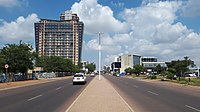
Photo from wikipedia
: 1.012_HHR Stronger Training Programs for Better Transitions and Improved Retention: The Experience of a Bridging Program to Facilitate the Transition from Medical School to Internship Training in Botswana M.J.… Click to show full abstract
: 1.012_HHR Stronger Training Programs for Better Transitions and Improved Retention: The Experience of a Bridging Program to Facilitate the Transition from Medical School to Internship Training in Botswana M.J. Peluso, C. Haverkamp, N. Tapela, R. Maoto, A. Bedada, S. Mantzor, R. Luckett, P. Saleeb, M. Haverkamp, M. Mosepele, D. Prozesky, O. Nkomazana, T. Barak; Brigham and Women’s Hospital, Harvard Medical School, Boston, MA, USA, University Research Co., Gaborone, Botswana, Botswana Ministry of Health/ Botswana-Harvard Partnership, Gaborone, Botswana, Botswana Medical Internship Training Programme, Gaborone, Botswana, University of Botswana, Gaborone, Botswana, Children’s Hospital of Philadelphia/Botswana-UPenn Partnership, Gaborone, Botswana, Scottish Livingstone Hospital/Beth Israel Deaconess Medical Center, Molepolole, Botswana, University of Maryland/Botswana-University of Maryland School of Medicine Health Initiative, Gaborone, Botswana, Botswana-UPenn Partnership, Gaborone, Botswana, University of Botswana/Princess Marina Hospital, Gaborone, Botswana, Scottish Livingstone Hospital/Beth Israel Deaconess Medical Center/Botswana Harvard Partnership, Molepolole, Botswana Program/Project Purpose: A focus on improving existing training programs in Botswana is seen as key to addressing the challenge of retaining medical doctors and preventing the attrition of medical graduates trained at considerable cost both in-country and abroad. Establishment of the national Medical Internship Training Programme (MIT) in 2014 represented a first step; here we review the addition of a dedicated bridging program for foreign and locally trained medical graduates in August 2016. The program aimed to facilitate medical graduates’ return and transition into internship training in the context of considerable baseline variability in knowledge, experience, clinical skills, and familiarity with Botswana’s healthcare system. Structure/Method/Design: We conducted a national, intensive, two-week program designed to facilitate the transition from medical student to intern and “bridge the gap” between foreign and local medical graduates. Formats included lectures, workshops, simulations, discussions, and reflection-oriented activities. All interns entering in August 2016 participated. The program was evaluated using the Kellogg Foundation Outcomes Logic Model and participants were assessed with paired questionnaires before and after participation. Outcome & Evaluation: Paired data were available for 48/54 participants (89%). Participants reported a high degree of satisfaction with the program (mean 4.2/5). Self-rated preparedness improved after participation (mean 3.2 versus 3.7, p<0.001), as did confidence across 18/19 knowledge/skill domains, suggesting the program prepared participants, particularly those who initially felt unprepared. 20/25 participants (80%) reporting either no or a negative effect following participation had rated themselves “extremely” or “quite” prepared beforehand, suggesting the program grounded expectations for interns who initially were overconfident. Interns commented on the benefits of learning about roles/responsibilities, interacting with clinicians from Botswana’s healthcare sectors, and the sense of community the program engendered. Going Forward: This program prepared medical graduates of varying backgrounds to begin internship with a common set of knowledge, skills, and expectations about their role in Botswana’s health system. Gathering retrospective feedback at a later point may add insight regarding impact on internship outcomes and decisions on professional migration. Our results may be of interest to educators dedicated to training, professional transitions, and career pathways in similar settings in the region and beyond. Source of Funding: Botswana Ministry of Health, University of Botswana Faculty of Medicine, Botswana Medical Education Partnership Initiative. Abstract #: 1.013_HHR: 1.013_HHR Creating a New OSCE Program at One Medical School in
Journal Title: Annals of global health
Year Published: 2017
Link to full text (if available)
Share on Social Media: Sign Up to like & get
recommendations!